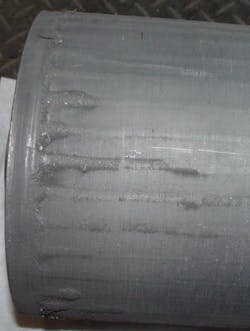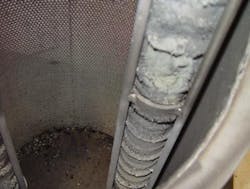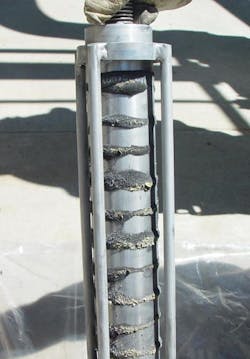REC Solar Grade Silicon LLC is the world's first dedicated producer of polycrystalline silicon for making solar panels. In early 2009 the company's plant at Moses Lake, Wash., started experiencing premature failures of its magnetic-drive pumps. The failures were blamed on ferrous metal (black powder) contamination in the piping system delivering trichlorosilane and dichlorosilane chemicals. Black powder buildup was evident (Figure 1).
Each magnetic drive pump handled approximately 900 gpm of trichlorosilane and dichlorosilane supplied by 10-in.-diameter carbon steel pipe. Black powder contamination originated from corrosion and erosion of the pipelines. Some of the fine ferrous powder could get magnetically trapped in the impeller drive, causing premature wear of the journal bearings, internal shaft, impeller and magnet carrier. The material also could compromise product purity.
Black powder ranges from 100 microns or more to sub-micron in size and typically contains 80% ferrous metals, 16%–18% silica, with the remainder other minerals. REC Solar Grade Silicon is hardly alone in having to contend with the material. Black powder causes many costly problems in the processing and refining industries -- such as product degradation and premature wear of rotating equipment (pumps, turbine and compressor components, etc.). It also afflicts pipelines; fluid in the pipeline picks up metal contaminants, which then act like sandpaper to create more ferrous particulate. "We have seen situations where there is so much black powder in a line that traditional filters become clogged, pipeline flow is reduced and meters become plugged thereby increasing downtime and reducing production values," notes Roger Simonson, president of One Eye Industries, Calgary, AB.
The plant contacted One Eye Industries, which recommended and supplied three magnetic-separator basket strainers for installation immediately ahead of the pumps. These strainers feature oversized housings to allow maximum exposure of their patented magnetic technology. The design ensures efficient contamination removal from high flow and viscous fluids with minimal flow restriction. One Eye Industries is the only company that currently employs this type of magnetic technology for contamination removal. The basket strainers are inexpensive and typically pay for themselves in a month.
In just three days the magnetic separators eliminated the majority of ferrous and non-ferrous contamination from the chemical stream (Figure 2). "Upon opening the basket strainer we were quite amazed to see the amount of contamination trapped by the magnetic separators -- not only did [they] remove ferrous material but we also noticed non-ferrous material captured by the magnetic separators," says Michael A. VanDeVanter, reliability engineer at the Moses Lake plant. Figure 3 shows the non-ferrous contamination, which is trapped on the magnetic separators by static adhesion. Flow inside the pipeline creates a static charge on the non-ferrous materials. When exposed to the separator's powerful magnetic fields, they are pulled out of the fluid and trapped on the magnetic separator element.
To further evaluate efficiency of the magnetic separators, fluid samples were taken upstream and downstream of a strainer. Analysis showed substantial removal of ferrous material and a significant reduction in chromium, nickel and iron.
Despite contamination removal, pump failures continued. This led to identifying that a seal within the drives was inadequate for the application. Because the pumps were still under warranty, the vendor now is working to find a suitable replacement.
However, ferrous contamination certainly remains an issue — because of concerns about serious wear on magnetic-drive components and purity problems for the chemical within the production process. So, the Moses Lake plant continues to rely on the strainers. The plant cleans them monthly.
Rob Albee is general manager of One Eye Industries, Calgary, AB. E-mail him at [email protected].



